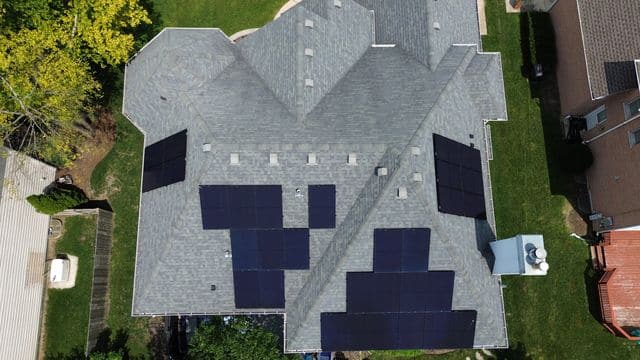Article at a Glance
- Solar panels have multiple components that go into determining the price, and different types cost more or less
- Generous incentives, including tax credits, can reduce the cost of residential solar panel installation
- Additional work to your home to accommodate the solar energy system can increase the price
With concerns about soaring energy rates and finding ways to become more energy-independent and combat climate change becoming more prevalent among homeowners, residential solar panel installation is becoming more popular.
However, one stumbling block for many would-be solar panel owners is the cost. In the past, solar panels were expensive and didn’t always provide enough power to pay off. Today’s solar panels are more powerful and efficient than ever before, capable of significantly reducing utility costs and providing a stable and reliable source of electricity.
As with most home improvements, there isn’t a single answer to the question of how much it costs to install residential solar panels. The price tag varies depending on a wide range of factors, from the system size to the installation costs. Here, our guide to solar panel home installation costs explains what you need to know when leaping solar power.
Key Components That Determine Solar Panel Installation Costs
The average cost for the installation of solar panels can vary from less than $10,000 to more than $50,000. There isn’t a standard rate in the industry, as every customer and setup is different. Instead, the cost for your solar panels and installation depends primarily on the number of watts of electricity you want the system to produce and the average per-watt charge in your area.
The overall price per watt for your solar panels depends on several factors.
Learn more about solar panel costs and savings
The Solar Panels
The actual solar panels can account for up to half of the per-watt charge for the panels. The actual price depends on the type of panel you choose, its size, and its energy production capability.
Charge Controller
This is a critical safety feature that keeps the system from overcharging and helps preserve solar panel efficiency.
Inverter
The inverter converts the electricity the panels produce (direct current, or DC) into the alternating current that powers your home
Battery Storage
If you plan to store the energy that the solar panels produce, you need a battery, which, in many cases, is the most expensive element of the residential solar panel system. If you plan to connect your solar panels to the local utility company grid, you don’t necessarily need a battery.
Labor Costs
The cost of solar installation in homes includes labor charges, which vary by company.
Additional Cost Factors in Residential Solar Installation
The cost of equipment and labor comprise the biggest part of the cost of adding residential solar panel installation, but there are other factors to think about as well, like:
- Site survey and system engineering
- Permits
- Mounting hardware
- Monitoring and telemetry systems
- Maintenance
Installing solar panels may also require some substantial prep work, such as trimming trees on your property to ensure maximum sun exposure. The solar company will also evaluate your home’s roof suitability to ensure it can safely accommodate the equipment. If the roof is old or damaged, you’ll need to repair or replace it before installing solar panels, which is an additional expense.
Additional Read: Home Solar Financing Options
Reducing the Cost for the Installation of Solar Panels
Adding solar panels to your home is an effective way to save energy and reduce your carbon footprint. However, it requires a significant investment, which is why the government and local utility companies offer tax incentives and rebates to help offset the cost.
For example, the federal government currently offers a 30% tax credit on the purchase and installation of solar panels. This credit can effectively reduce the cost of the panels by several thousand dollars. You may also qualify for other incentives, like breaks on your property taxes and credits for selling your excess power back to the local utility company.
Of course, you cannot overlook the potential for lower electric bills when determining whether to invest in solar panels. Even if you don’t eliminate the bill, switching to solar can reduce it. Depending on your overall energy costs, the cost to install panels on your home, and how much power they produce, your new solar system could pay for itself in just a few years.
Request a Quote to Find Out “How Much Does It Cost to Install Residential Solar Panels?”
As solar energy becomes more accessible thanks to technological advances, the cost of residential solar panel installation is also going down. If you’re ready to embrace the possibilities of solar energy for your home, get a free custom quote from RxSun or call us at 800-607-9786 to discuss the potential for your home and schedule a consultation.
 800-607-9786
800-607-9786

 1-800-60-RXSUN
1-800-60-RXSUN